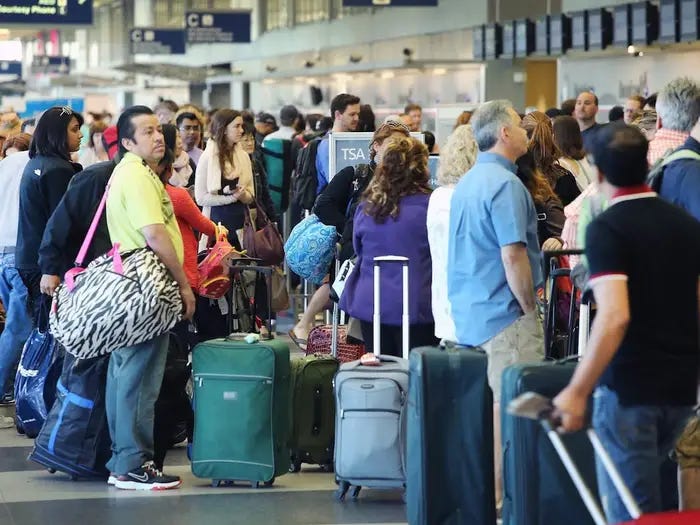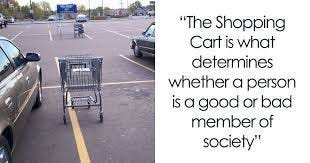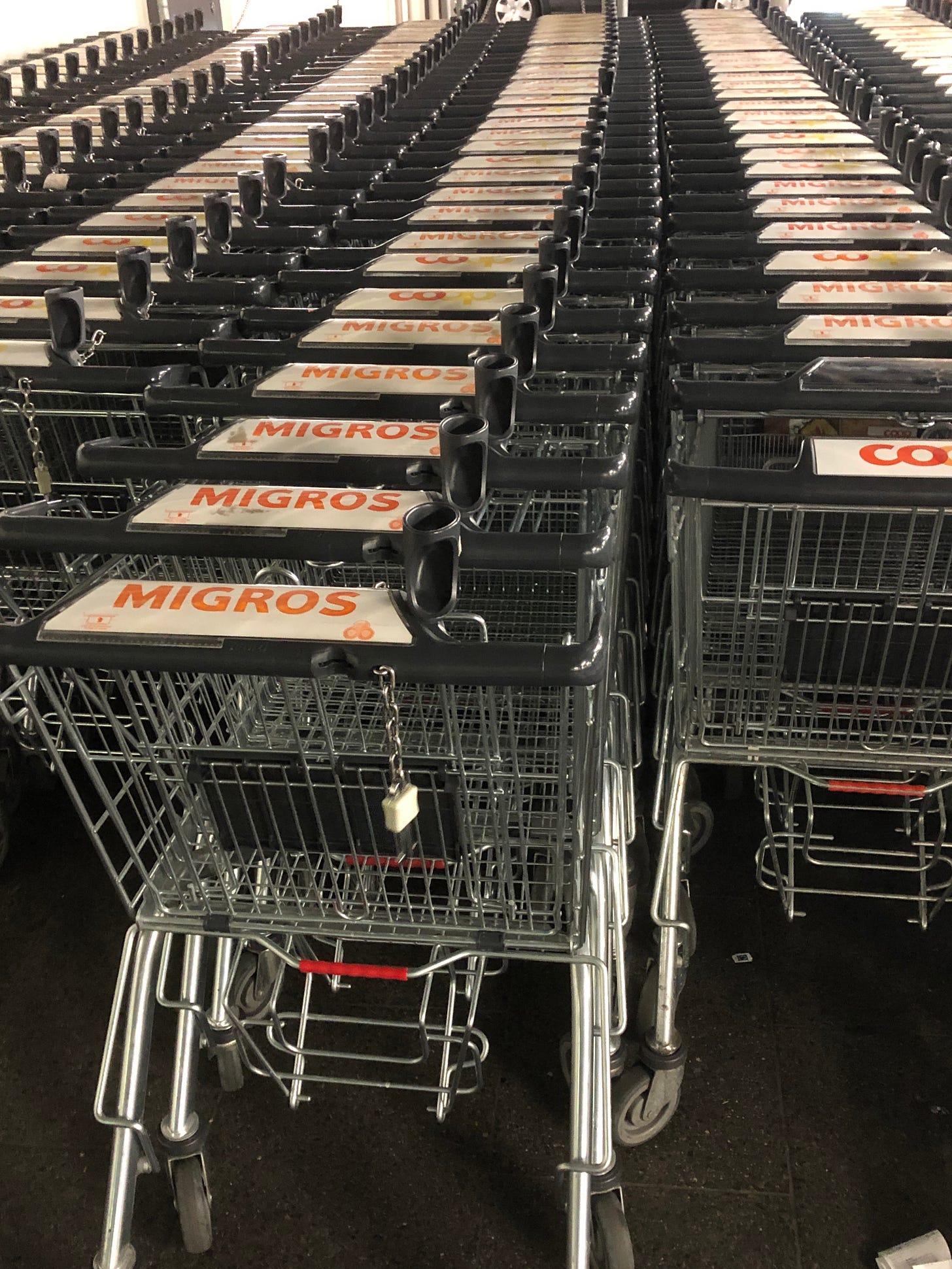Unless you have your own plane, you, like me, probably don’t enjoy flying. While I am grateful that we can be whisked around the world safely, the process of flying is needlessly frustrating and unpleasant. Think about the last time you flew: you waited in the endless line at the ticket counter, you had to strip off your shoes and outerwear—and even, as though it were somehow impenetrable to the metal detector, your hand-knit cardigan sweater!—and unpack and then repack your bag at security. You braved the grouchy crowd at the gate, weathered the glacial boarding process, fought through the clogged aisle, worried about whether there would be space in the overhead compartment, and risked missing your connecting flight because of the long wait to deplane while the poky people ahead of you lumbered along with their cumbersome bags.
There is a better way! But first, a word about perverse incentives.
Perverse incentives
A perverse incentive is not nearly as much fun as it sounds. It is a misalignment between our goals and what we’re actually paying for. Ideally, we should reward behaviors we like and ignore or punish those we don’t, but a perverse incentive rewards people for making things worse. This article lists some examples of perverse incentives that will simultaneously amuse and frustrate you.
I first encountered a perverse incentive when I was in elementary school. A teacher gave the entire class detention for some obscure reason,1 and so we all had to stay inside at lunchtime. At first I, a goody-goody, was upset at the injustice, but then I noticed that instead of having to go outside and huddling near the building, trying to protect exposed flesh from the arctic Minnesota -40F2 winter, I could stay in a toasty classroom and read my book. “No wonder kids always break the rules, if this is their punishment!” I thought.
A Simple fix for flying
To return to the issue that prompted this post, I think the airlines have it exactly backward. They charge a significant amount ($30-50 on my recent flights) for each checked bag, while carry-on bags are free. This is a perverse incentive: the policy encourages people to schlep overstuffed carry-on bags, which they then laboriously rummage around in at security, slowing down the line; to argue with gate agents about whether their bags are small enough to go into the compartments, slowing down the line; to obstruct boarding while they attempt to jam the bags into the aforementioned compartments, slowing down the line; and—to take a personal example—to injure other passengers when their enormous bags fall on them, slowing down the line as the flight attendant pushes back up the aisle to get an ice pack. We could fix all of these problems with a simple, elegant solution: Checked bags should be free, and we should have to pay to carry on any bag that is too large to fit under the seat.
Think about what a difference this change would make! Everything from the ticket line to security to boarding to deplaning would be quicker and easier if we didn’t have so many people trying to wrangle their stuff. The passengers who really need the speed and convenience of carry-on bags (e.g. business travelers) would pay the costs themselves (or their corporations would) rather than foisting the costs on other people in the form of wasted time. And the rest of us would check our bags for free and glide unencumbered through the airport and onto the plane.
To forestall a couple of objections, yes, I know that one reason people take carry-ons is because they’re afraid the airline will lose their bags. This is a spurious fear. Airlines now use computerized tags and electronic sorting, so the risk of lost luggage is extremely small—about .3 percent. And if the airline loses your bags, it must compensate you. As for waiting around after the flight to pick up your luggage, yes, it can sometimes take a while—Delta promises a maximum wait of twenty minutes, for example—but airlines are also required to compensate passengers for excessive waiting at the baggage claim. And remember that with appropriately applied baggage fees, your wait time before your flight would be significantly reduced, so your total time in the airport would be shorter, and much more pleasant too: instead of hanging around the baggage area, you could use those twenty minutes to duck into the bathroom, take a walk, get a treat—all more attractive prospects than spending twice as much time confined to lines at security and in a tight airplane aisle getting on and off the plane.
Moralizing vs. incentivizing
In situations like this we are often tempted to draw unflattering conclusions about other people’s morals, when in fact they are simply responding logically to perverse incentives. I judge the people with huge carry-on bags as inconsiderate, until I remember that it’s not their fault: the airline, by charging for checked luggage, is paying them to inconvenience everyone else. A more effective way to address problems than shaming people is to realign incentives so that we pay them to do the right thing. Here are some additional examples of apparently immoral behaviors that can be quickly fixed with appropriate incentives.
Beer prices. The Czech Republic has a fair claim to being the beer capital of the world. Not only is its beer absolutely delicious, but it is cheap—famously, a half-liter of beer costs less than water in most places. Unfortunately, this is a perverse incentive. When beer is the cheapest choice, well, people choose it. And then you get a lot of loud drunk people roaming the streets of Prague at all hours.3

Or, that’s how it used to be. Beer is no longer the cheapest item on the menu in Prague, because city officials recently passed a law that restaurants and bars must offer at least one nonalcoholic drink that is cheaper than beer, in an effort to encourage people not to drink to excess.
Shopping carts. In the US, shopping carts have become a symbol of a person’s morality. I suspect that most readers have seen a version of the following meme:
Shopping cart corrals are an example of a perverse incentive. There is no reward for returning carts to the corral; quite the contrary, there is an incentive to save time by just leaving them to roll around the parking lot like baffled cattle while we rush off to our next errand. So memes like this one attempt to shame people into doing the right thing.
The eminently practical Swiss, on the other hand, have devised a clever incentive to get people to return their carts. Check out this photo, which I took at my local grocery store:
Look at those orderly rows! While it might be tempting to ascribe these tidy carts to the highly-organized Swiss character, in fact the carts always look like this because of a simple yet ingenious incentive. The carts are chained together, and to dislodge the key from the lock, you push in a coin or token, which pushes the key out and frees up the cart. After you’re done shopping, you have to return the cart in order to get your coin or token back: you push the key back into the lock, and the key pushes your coin or token out the other side. Neat, huh?
Recycling. We castigate people who don’t recycle. “They are so selfish! Don’t they care about the Great Pacific Garbage Patch?!” we mutter to ourselves. But in fact, recycling in the US is a perverse incentive: it takes time out of our day and space from our homes to recycle properly—all that sorting, rinsing, label-removing, breaking-down and flattening, storing until pickup—for which we receive no compensation. We pay the same rate for garbage whether we have been responsible or whether we blithely toss all our recyclables into the trash. The Swiss, on the other hand, have thought up a clever incentive: you pay for your trash per bag (about $2.25 per bag in our town), and so you only pay for the trash you don’t recycle.

Swiss communities place recycling bins for plastic and glass in public areas, sponsor free curbside pickups of recyclables, and fund drive-up recycling centers. Because of these incentives, recycling is easy, and we are paid to do the right thing.
Why pay twice?
My wonderful father-in-law used to say “Why pay twice?” whenever we wanted to duck out of an underwhelming cultural event at intermission. Yes, we had already paid for the tickets, but that didn’t mean we also had to pay with our time by sitting through something we weren’t enjoying. This idea also applies to incentives: we want to be sure that we get something worthwhile back for our tax dollars, and that we aren’t providing a perverse incentive for policies that hurt us.
In the US, we pay twice with farm subsidies. These subsidies go primarily to large corporations like Cargill and Archer Daniels Midland and to huge corporate farms. Subsidies to corporations and factory farms are a perverse incentive and encourage practices that are bad for the environment and our health. In particular, the subsidies push farmers to grow monocrops like corn and soy, which cause soil depletion and drought and necessitate greater use of chemical fertilizers and pesticides that get into the ground water. Manure lagoons from factory farms contaminate the water and the air. High-fructose corn syrup in processed foods contributes to obesity. Cattle, which evolved to eat grass, have trouble digesting corn, so cattle that are fed corn require constant medication with antibiotics, which has led to antibiotic-resistant bacteria. I could go on, but instead I highly recommend Michael Pollan’s excellent book The Omnivore’s Dilemma on this topic.
We could convert farm subsidies from perverse incentives into benefits if we subsidized small family farms and gave money to farmers who, for example, rotate crops and let fields lie fallow, treat animals humanely, fertilize with manure rather than chemicals, and grow healthy vegetables in addition to corn and soy. If we turned farm subsidies from perverse to positive incentives, we would still be paying, but at least we would only pay once, and we would get a return on our investment.

How about you, readers? Do you have examples from your own life of perverse incentives? Do you have a great fix for an irritating problem, if ONLY someone would listen to you and implement it? Please share your thoughts in the comments!
The Tidbit
And now, some adorable facts about otters, which I have cribbed from a comment thread on Anne Helen Petersen’s blog, Culture Study:
Otters have little armpit pockets that they store snacks and tools in.
Sea otters have the densest fur in the world—a million hairs4 per square inch.
Otters keep the same rock for opening shells their entire lives.
Otters hold hands while they sleep so they don’t float away from the group.
The collective noun for otters is a raft.
Based on my memories of this teacher, I find it entirely plausible that he was just feeling irritable that day.
Not an exaggeration.
A friend used to live in the tourist center of Prague, and the noise got so bad that she kept a huge bucket of water under her window to dump on drunken louts at 3am.
This number seems implausible to me. Caveat emptor: I have not fact-checked these claims!







Hi Mari. As you can see, I'm hoping to go back through your Happy Wanderer articles that I've read in the past, and catch up on the ones I haven't read. Whenever I have a meaningful comment to offer, I'll do that as well.
Today I remembered an example of a perverse incentive.
Rich and I have gotten into collecting fragrance bottles, which range from $30 to $200 per bottle or more, depending on numerous factors. Of course we are very particular about being as frugal as possible with this hobby. Just as is often true with selecting quality bottles of wine, we've researched and found quality bottles of fragrance that are on the affordable end of the price spectrum.
Occasionally we've decided to purchase pricier fragrance bottles. Here's where the perverse incentive comes in. We could drive nearby to a local department store and purchase these high end fragrances. But if we did, we would pay $50 or more per bottle... than if we order them online, and have them flown over the Atlantic Ocean to be sent directly to our house. I'm embarrassed to say this. Ugh.
Here's why these high-end fragrance bottles cost at least 25% less, when we buy them from online European fragrance stores:
[A] we do not have to pay the European Value Added Tax (VAT), as American customers, that European customers would have to pay;
[B] we do not have to pay the import taxes that American retail stores pay and pass on to American customers via retail pricing; and
[C] we usually bypass additional delivery charges, because the total we spend at the European online store qualifies us to do so. Of course the actual delivery charge was included in their retail price in the first place... but it's still an additional charge we bypass.
So all of this adds up. We rarely buy bottles of fragrance that are at the $200 price point. When we do, we'd rather pay $150 than $200. But it really bugs me. I'd much rather we be rewarded to drive five minutes from home to purchase the same product that was already delivered locally, presumably at a more energy efficient bulk rate. Man... I'm not Catholic, but this feels like confession to me. Ugh.
Love the airline bag idea!!!!!
Regarding the shopping cart dilemma, I have had this same conversation with people on Facebook. At my local ShopRite they employ mentally disabled and /or older citizens to collect the shopping carts and return them to the store front, they do not have corrals available to the shopper. So we are actively encouraged to abandon our carts and somebody is employed that might otherwise have difficulty finding a job. However I do take care to leave mine at the front of my car allowing the next person to park easily. When I visit any grocery store that has a cart corral I always use it.
I also agree with your “why pay twice” a different example from my household: if a meal that I have spent time making turns out meh my son and I will say so and find an alternative. Meanwhile my husband plows through the meal despite the unappetizing result. Tim and I are of the opinion that calories consumed should be palatable! My husband will even eat burnt or undercooked (usually pastry or cakes) food!!!